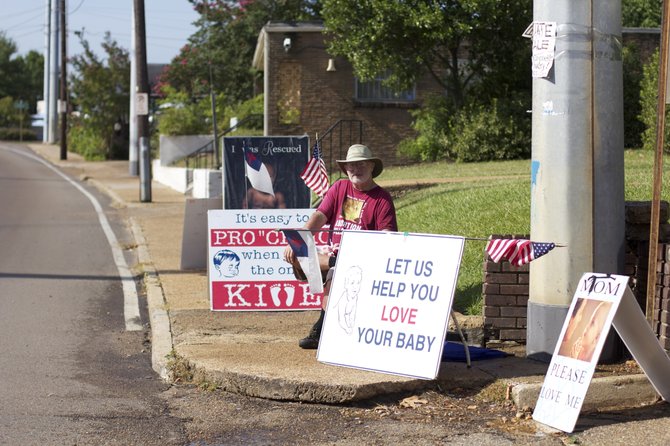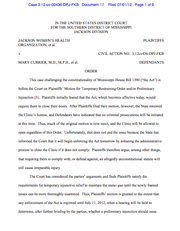Protesters gathered outside the Jackson Women's Health Organization this morning after a federal judge moved last night to keep the clinic open at least 10 more days. Seated is Roy McMillan, husband of Pro-Life Mississippi President Beverly McMillan. The couple is also against birth control including the pill and the morning-after pill. Photo by Virginia Schreiber.
JACKSON — State lawmakers and executives may have bitten themselves in the behind when they opened their mouths to boast about effectively ending abortion in the state with House Bill 1390.
The law, signed by Gov. Phil Bryant in April, requires doctors at abortion clinics to be registered OB/GYNs and have admitting privileges at a local hospital. Lt. Gov. Tate Reeves, along with other state Republicans, boasted about the law closing the state's only abortion clinic, located in Jackson, and eliminating legal abortion in the state.
"The Legislature took steps to end abortion in Mississippi by requiring doctors performing abortion to have admitting privileges at a local hospital," a May 3, 2012, press release from Reeves stated. "This measure not only protects the health of the mother but should close the only abortion clinic in Mississippi."
The Law went into effect July 1, but U.S. District Court Judge Daniel Jordan issued a temporary restraining order the same day. The TRO prevented the state Department of Health from beginning an administrative process that would close the clinic if the doctors their did not meet the new requirements.
Jordan set a hearing for July 11 to decide to extend the TRO or not. Jackson Women's Health Organization, located in the Fondren district of Jackson, will stay open at least until July 11.
"Though the debate over abortion continues, there exists legal precedent the Court must follow. Applying that law, the Court finds that a TRO should issue," the court order states.
Mississippi College law professor Matt Steffey said examined the TRO and the law this morning. He said that openly admitting that the real purpose of the law is to eliminate abortion, not to make women's health safer, may not have been a good legal decision for the pro-life camp.
"It certainly helps the plaintiffs make their case," Steffey said. "Many of these (efforts) directed for the explicit purpose of shutting down the lone remaining abortion clinic are going to immediately be challenged. Those challenges are going to be difficult to set aside."
Judge Jordan wrote that this was a main issue in his order.
"In this case, plaintiffs have offered evidence--including quotes from significant legislative and executive officers--that the act's purpose is to eliminate abortions in Mississippi," the order states. "They likewise submitted evidence that no safety or health concerns motivated its passage. This evidence has not yet been rebutted."
The order states that the Department of Health could not have shut the clinic down once the law took effect July 1, anyway. Rather, if the TRO is lifted and law takes effect, "the State will commence administrative proceedings that will allow the Clinic time to comply before it is closed."
Diane Derzis is the president of the Jackson Women's Health Organization, the state's only abortion clinic. She said the doctors at the clinic have applied for admitting privileges. The process is usually a lengthy one, she said, but it will probably be even lengthier for abortion doctors. She said the application was 50 pages long.
"We have made applications to every hospital in this area, except St. Dominic," Derzis said. "They told us not to bother."
Steffey said he expects the hearing to last days, not weeks. The 5th Circuit Court of Appeals will ultimately make a decision on the law, though, Steffey said, in an overall court process that will likely take one to two years. Whether the clinic stays open during that time will depend on Judge Jordan's ruling in the hearing that begins July 11.
Anti-abortion protesters were on the sidewalks outside the clinic at 6 a.m. today. One protester, Ashley Sigrest, said she is the kind of activist most mainstream media don't want to talk to: a woman who has had an abortion.
Sigrest had an abortion at a small clinic in Houston, Texas when she was 18. She said she was raped, and waited about five months before she had an abortion. If anyone had been outside the clinic in Houston the day she got an abortion, as she was this morning in Jackson, she said she probably would not have had the procedure.
"The regret a woman feels from choosing an abortion is the deepest pain known to man, I have no doubt," Sigrest said. "It's not just the loss of a child. It's you chose to kill your child for whatever reason. That is the pain that is hard to live with. I suffered from post-traumatic stress disorder. I drank so much to numb myself. I had horrific nightmares, (that) had nothing, ever, to do with the rape. Once I realized what I did in that abortion, in killing my child, I could care less about the rape."
Cristen Hemmins is also a victim of rape. She helped organize the successful fight against Proposition 26, known as the Personhood amendment, last year.
"The people who want to shut down the clinic have made it so clear that it is not about women's health," Hemmins said today. "It's simply about shutting down the clinic. I had hoped that a legal suit would keep it open. I was really relieved that it looks like that is going to happen."




